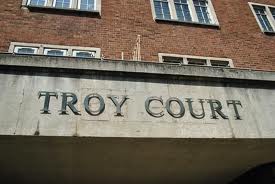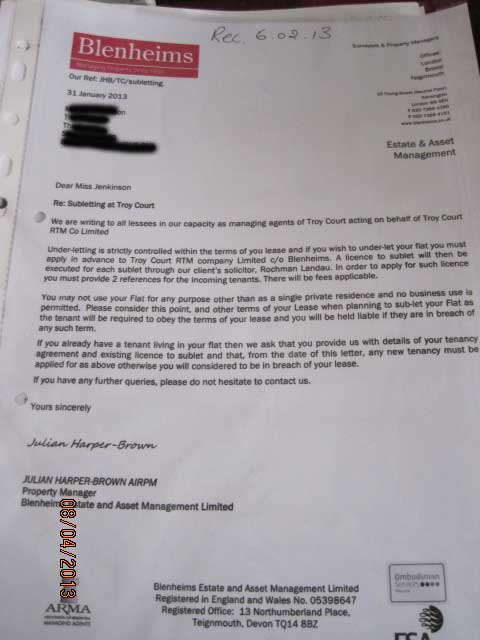
Troy Court in Kensington High Street – one of the most desirable addresses in the country – has been so plagued by unwelcome tenants, including prostitutes, that it is making flat owners pay eye-watering sub-letting fees that in one case amount to £912, including VAT.
Claire Jenkinson is so incensed by the “astronomical” demand passed on to her by Blenheims Estate and Asset Management Limited that she sent it on to LKP. She is refusing to pay the sum.
“How can they possibly justify these fees, when in the article I have just read on your website indicates that a fee for a licence to sub-let should cost approximately £40?” she writes.
The Land Tribunal, whose decisions are binding on the lower Leasehold Valuation tribunal, made multiple rulings last year on sub-letting fees, declaring that £40 plus VAT was a reasonable charge.
 Ms Jenkinson owns a flat at Troy Court, a large 1930s apartment block sited on Kensington High Street at the entrance to Holland Park. Property prices here are the highest in the country and a two-bedroom flat at Troy Court would cost at least £850,000.
Ms Jenkinson owns a flat at Troy Court, a large 1930s apartment block sited on Kensington High Street at the entrance to Holland Park. Property prices here are the highest in the country and a two-bedroom flat at Troy Court would cost at least £850,000.
Ms Jenkinson’s lease is for 200 years and a clause concerning sub-letting includes the standard reference to “consent not to be unreasonably withheld”.
Indeed, the Office of Fair Trading has declared that restrictions on sub-letting amount to an unfair contract term: “In relation to sub-letting, we still take the view that terms in long leases preventing sub-letting have potential for unfairness under the Unfair Terms in Consumer Contract Regulations (UTCCRs). In our view a consumer should be able to seek permission to assign (by means of a sublet) and that permission should not be unreasonably withheld.”
On two previous occasions, Ms Jenkinson has rented out the property without any difficulty by simply informing the managing agents in writing of the new tenants. It would appear that her dispute is really with the residents’ management company that runs the block.
Two years ago she was vaguely aware that the RMC were considering the introduction of restrictions for new tenants “because there have been a few problems with unscrupulous landlords letting flats to prostitutes and other undesirable people”.
But it was only in January this year, when she signed up a new tenant, that she actually encountered a “licence to sub-let”.
On January 31, Blenheims wrote to Ms Jenkinson telling her:
“Under-letting is strictly controlled within the terms of your lease and if you wish to under-let your flat you must apply in advance to Troy Court RTM Company Limited c/o Blenheims.”
It added that “no business use is permitted” and “any new tenancy must be applied for as above otherwise you will considered to be in breach of your lease”.
 Jenkinson claims that initially Blenheims sent her a bill for £500 in legal fees for a firm of solicitors, plus their own £60 for its “administration costs” (both plus VAT).
Jenkinson claims that initially Blenheims sent her a bill for £500 in legal fees for a firm of solicitors, plus their own £60 for its “administration costs” (both plus VAT).
Further conditions were that she provide “Professional reference and character reference for named occupier (character reference can be a personal reference, ie from a friend). Confirmation that a family will occupy the flat. Names of occupiers who will reside during the sublet. No sublets to be approved if lessee is in arrears.”
Jenkinson says: “I sent them three professional references for my new tenants plus a photocopy of our signed tenancy agreement, but not the fee which I considered from the start to be outrageous.
“I have asked for a formal invoice for these fees and explanations of what exactly I am paying for over and over again, and Blenheims has not answered many of my questions with regard to the fee. We have been arguing this now for two months.”
Julian Harper-Brown, of Blenheims, replied last week informing an appalled Jenkinson that the actual fee of the licensing procedure was now £912, including VAT. He writes:
“I have copied the board [of the RMC] in on this so that all are aware of the total fees and requirements for the licence and there will be no further confusion on this matter.
To surmise,
Ashfords LLP £400 +Vat @20%= £480.
Taylor Wessing, £300 +VAT @20%= £360
Blenheims Administration £60 + VAT @20%= £72
Total to be paid = £912
“I trust this now answers your query for clarification of costs and look forward to moving on from this subject. I trust you have a pleasant weekend.”
Regards Julian Harper-Brown AIRPM
It is not clear at this stage why two firms of lawyers are involved or what they are actually doing for their money. Presumably, they are drawing up some kind of licence, or perhaps vetting the incoming tenants.
“Am I right in standing up for my rights here and now their fees are astronomical I feel even more strongly that I am indeed potentially being ‘Ripped Off’?” writes Jenkinson.

























While the £10 might well be a notification fee and outside the jurisdiction of the LVT, the fees for consent are administration charges under Sch 11 of CLRA 2002 and the lady is best to refer the matter to the LVT for determination.
As stated above this is probably challengeable in an LVT. The leaseholder should check to see if the charge was accompanied by a statement giving their legal rights in relation to administration charges, as required by the CLRA. If no statement, they can withhold the charge. Check your paperwork!
Unless I am very much mistaken, prostitutes do not rent flats on a long-term basis and there are probably restrictions on short-term letting already in place.
The idea of the RMC attempting to impose unfair contract terms on some kind of moral grounds of its own should be legally actionable and they should be liable for lost rental income. The prohibition in the lease on the conduct of business should be sufficient.
After all, the owner is entirely free to sell the flat to whomever she wishes, and if the new owner were a woman determined to discuss Uganda with every interested and willing man in the block (on the house, so to speak), well, that would be hard luck – or good luck, depending on your point of view.
If the lease calls for consent, and given the involvement of two law firms it might require the consent of the freeholder or head lessor, then the RMC is right to pursue managing underlettings as the lease requires. Contrary to the view expressed about “ladies of negotiated affection” they do buy and rent in some parts of London and are not restricted to council flats or rooms above shops.
The law provides ample protection for leaseholders where the LL ( which includes an RMC) withholds consent unreasonably as well as acting beyond the authority and requirements of the lease